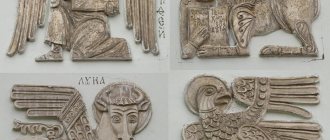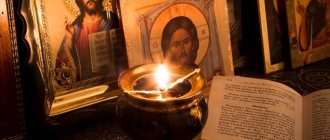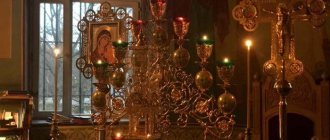When visiting Church, many people do not know how to submit notes about health, repose and how to compose them correctly so that a prayer can be heard in the temple, which has divine power, because it is read by the priest who performs the sacred rites.
What are the rules for writing notes?
The notes are written by hand in block letters, on special pieces of paper at the entrance to the church, they are served at the liturgy, that is, at the beginning of the central service of the Orthodox Church, they can be simple or custom-made. The note should not contain:
- More than 15 names, they are written in legible handwriting. “Sick”, “prisoner”, etc. are indicated before the name.
- Last and patronymic names are not indicated.
- A child under seven years of age is referred to as an "infant"
- In the note of repose within 40 days after death they write “newly deceased.”
At the beginning of the service, the priest in the altar reads the notes “On Health” and “On Repose” and takes out particles from the prosphora for all the people indicated in the note. At the end of the service (liturgy), these particles are immersed in a special bowl, and the clergyman prays for the remission of all sins.
The only difference in the preparation of notes is that they are read at different moments, depending on when the parishioner visited the Temple of the Lord. Eg,
- A prayer service is a service that is performed outside the altar, at the request of a parishioner. Notes are read only “For Health”, to the Saint, the Mother of God or the Lord, where they ask for their loved ones and wish them good health. Notes are submitted on a birthday, baptism or on the day of remembrance of his saint.
- A memorial service is a funeral service. It is not carried out on suicides and people who have not been baptized in the Orthodox faith. People are commemorated according to the church calendar, as well as on the day of death and birthday of the deceased person. A memorial service is ordered both before the burial of the deceased and after on the 3rd, 9th, 40th, day, etc.
It is important to know: The living and the dead are remembered at the liturgy; on this day, the blood of Christ cleanses the sins committed by people. Some churches accept notes for a custom-made mass for health with a prayer service and a custom-made mass for repose with a requiem. The divine service is performed not by one priest, but by all the believers present in the church, so it is very important not only to submit a note, but also to stay for the service!
I also recommend reading: Which saints help with what.
The religious thoughts and feelings of a believer in God's mercy and grace cannot remain without external detection all the time. Prayer services and memorial services, as types of worship in Orthodox churches, are external forms of expression of religiosity. Today we will tell you how a prayer service differs from a memorial service.
Information about the service
The religious feeling that overwhelms a person who believes in the Lord God cannot but manifest itself externally. Our ancestors said that religion is a kind of cult of veneration of our Savior Jesus Christ, who repented of the sins committed by people and accepted death on the cross.
Faith and spirituality can work miracles, protecting you from troubles and difficulties along the path of life, various psychological and physiological illnesses, injuries, gossip, anger and hostility from unkind people. In order to gain God's grace and mercy, a believer turns to the Lord God in daily prayers, asking for protection and protection, making speeches of gratitude for the help provided in daily matters.
Despite the fact that many Christians who believe in higher powers often pray at home, the prayer that is read within the walls of an Orthodox church has greater power. Church worship is the outward expression of religiosity in public prayers and rituals.
Orthodox worship, as clergy say, teaches and spiritually educates Orthodox Christians in faith and justice, enriches them spiritually and physically, and provides food for thought and search for the righteous path. Worship has a huge impact on a person, giving strength to revive and restore faith in oneself and our Savior Jesus Christ.
Prayer service, memorial service and magpie are types of church services in the Orthodox faith. A person who is unfamiliar with the rules of conduct in a church and does not know the church charter often confuses the meanings and features of various religious rituals.
The prayer service, the fundamental parts of which are the Gospel, canonical texts, prayer chants, troparia and litanies, is a special form of worship of the Lord God, the Most Pure Virgin Mary and the holy great martyrs. This prayer ritual allows you to turn to the Higher powers, asking the Savior Jesus Christ, the Most Holy Theotokos and the holy saints to send down mercy and grace.
A memorial service is a special form of church service, consisting of prayer texts about the forgiveness of sins committed by the deceased, as well as about the repose of the souls of deceased Orthodox Christians in the Kingdom of Heaven. In his prayer speeches, the clergyman asks the Lord God to grant His mercy and blessed eternal life to the departed righteous.
Sorokoust is a special prayer for the health or repose of the soul of an Orthodox Christian. This ritual is repeated daily for forty Divine Liturgy.
The meaning of the prayers of relatives for the soul of the deceased
When a person dies, his soul passes into another world, where he is forced to undergo difficult trials, the purpose of which is a great transformation. But this stage is difficult to go through on your own without receiving help, because the incorruptible shell does not have the opportunity to repent and atone for its sins. Relatives do this.
This is how the main help provided by those close to the soul of the deceased is manifested.
In addition, prayer is pleasing to God, for “Whatever you ask in faith, I will do” (Matthew 21:22). Sacred words addressed to the Lord sincerely have great power. For this reason, it is so important to pray for each other. Then the one for whom the prayer is being made will be saved (will receive healing, forgiveness, etc.). The same principle applies when performing services in honor of the dead. This explains why pronouncing sacred words is the best way to help the deceased, which reduces the importance of commemorating the deceased directly at the graves, and performing rituals aimed at alleviating the fate of his bodily shell.
Prayer for the deceased
Main differences from a memorial service
At the end of the Divine Liturgy, the clergy of Orthodox churches perform services. One of the most common forms is a prayer song about the health of the righteous of the Christian faith. This can be a prayer for everyday needs and everyday needs, for the protection of a traveler on a journey, for healing and the granting of health to the sick.
You need to order a service for health behind a candle box. A person who ordered a prayer service for health and left a donation for the development of the temple of God may not be present at the service itself, conducted by the clergyman.
Sometimes the prayer chant is supplemented with the reading of folk prayers, called akathists, and canons. At the end of the service, the priest anoints the worshipers with blessed oil and sprinkles them with holy water.
Prayerful remembrance of the dead, or memorial services, came to us from ancient times, when devout Christians, under the cover of night, secretly collected the bodies of the tortured righteous who did not want to renounce their faith in Jesus Christ. The burial of the dead was accompanied by singing and lighting of candles.
Today, a memorial service can be performed both before the burial of the deceased and after his body is committed to the earth. Prayerful remembrances of the deceased are held:
- on the third, ninth and fortieth days after death;
- on the anniversary of death;
- on the birthday of the deceased;
- on the day of the namesake.
During the funeral service, worshipers stand with lit candles, depicting their faith in a bright future life. At the end of the service, the candles must be extinguished. Earthly life, like a candle that has not burned out, must go out.
Types of prayers
In Orthodoxy, there are several types of prayers, each of which can be ordered separately or collectively when there is a large gathering of parishioners in the church:
- A prayer service of thanksgiving is performed in front of a large number of faithful parishioners in the church on the days of the New Year, the Nativity of Christ and other significant dates.
- Petitionary prayer chants are performed regarding various needs and events (diseases and epidemics, natural disasters and troubles in life, a long road, starting a business, crop failure, etc.).
- Every day, including on Sundays, water-blessing prayer rituals are held, after which the water is blessed.
- Prayer chants, accompanied by the reading of akathists before miraculous and popularly revered holy images.
How to order correctly
Many people are interested in how to properly submit notes for a clergyman to conduct a religious service.
When submitting a note, you must indicate the type of commemoration: “On health” or “On repose.” Then the note writes to whom the prayer needs to be performed (the Savior Jesus Christ, the Most Holy Theotokos, the holy saint, indicating his church name) and in the genitive case the names of those for whom the commemoration is to be performed are listed.
Please note that all names written in the note should be indicated in full form and in church spelling.
If you find an error, please select a piece of text and press Ctrl+Enter.
The loss of a loved one always takes a person by surprise in any case, no matter what. In addition to the worldly concerns that need to be resolved after a tragedy, a person is also faced with the need to properly remember the deceased. For people who do not live church life, it is sometimes difficult to figure out what’s what and how to do everything correctly.
©
My heart and soul want to remember a loved one and put their soul to rest, but I have to figure out a lot: what a memorial service is, when the funeral service is held and why read the litiya. To make this task easier, the editors of “So Simple!” answers all these questions and tells what the difference is between a funeral service, a memorial service and a lithium.
Funeral service in church
The funeral service is a special prayer that is performed once over a deceased believer on the third day after death, before burial. The funeral service for the deceased is performed by a clergyman in a church or chapel. According to custom, the funeral service for the deceased must be performed on the third day, but there are cases when it is allowed to do this later, even after repose.
On all days, the funeral service is performed according to one rite, except for the days of Bright Easter Week. These days, instead of sad funeral prayers, joyful chants of Holy Easter are sung. On the days of the Resurrection and the Nativity of Christ, the deceased are not brought into the church, and the funeral service is not performed. In this case, it is postponed to the next day.
©
In the Orthodox Church, funeral services are not performed for the unbaptized, those of other faiths, those who fight against God, those who renounced Christ, or suicides. Until recently, funeral services for unbaptized infants were also not performed, but recently a special rite for this appeared. Therefore, parents who have experienced a terrible tragedy will be able to calm their hearts and pray for their child.
The funeral service is held in order to conduct the soul of the deceased to the Lord. The deceased needs nothing more from us, no worldly goods, only sincere prayer for him. This is what everyone on earth can do for a person who has gone to another world. During the funeral service, the entire church prays for the person’s soul, giving hope for the remission of all sins.
The funeral service for the deceased is performed once, on the day of the funeral. However, this does not mean that after this there is no need to remember the deceased. Still as necessary, just now not with a funeral service, but with prayer. This is precisely why memorial services, litias and simple prayers serve us.
©
The essence and meaning of Lithia
An important part of the Orthodox service is the lithium. Lithium from Greek. lite, fervent prayer, according to church usage means prayer outside the temple. In terms of the content of the prayers and the rite, the types of litia are very different from each other, but what they have in common is the departure from the temple.
Saint Simeon of Thessalonica says: “The litia is celebrated in the vestibule on holidays and Saturdays, and during some plague or misfortune it is sung at a gathering of people, either in the middle of the city, or outside it, near the walls.”
The origin of lithium is complete (this is in the first form), but in the others it is incomplete. But here and here it is performed mainly with the aim of expressing the prayer not only in words, but also in movement, to change its place in order to revive prayerful attention; The further purpose of the lithium is to express - by removing from the temple - our unworthiness to pray in it: “we pray while standing before the gates of St. temple, as if before the gates of heaven... like Adam, the publican, the prodigal son.” Hence the somewhat repentant and mournful nature of lithium prayers.
What is a memorial service
A memorial service is a funeral service performed in memory of deceased Christians. Memorial services are held on special days of remembrance: the third, ninth and fortieth days after the death of a person, anniversary, birthday, parental Saturdays, Radonitsa and other established days.
On the third day, the church asks to resurrect a person for eternal life. In the ninth, he asks to number the deceased among God’s saints, and in the fortieth, a prayer is made that Jesus will lift him up into the Kingdom of Heaven. On these days, it is obligatory to perform funeral services and pray for the deceased.
©
In general, you need to remember the deceased in church as often as possible and not only on designated days. The church performs the main prayer for the departed at the liturgy, offering a bloodless sacrifice to the Lord for them. To do this, before the start of the liturgy, you need to submit notes with the names of the deceased. But part of the proskomedia will be taken out of the prosphora for the repose of those whose names are written down, and at the end of the liturgy, particles of the prosphora will be lowered into the holy chalice and washed with the blood of Christ.
This is the greatest good we can do for our departed loved ones. You can also give alms or bring food to church on memorial days of the deceased. If you have nothing to carry, then a simple candle will be enough. The main thing is that you say a prayer and the soul of the deceased rejoices.
©
When and why is the Lithium ritual performed?
There are two types of lithium: evening and for the dead. These two types of lithiums are very different; the only thing they have in common is that they both do not take place in the temple itself. The evening lithium can take place in the vestibule or near the temple from the outside, and the lithium for the deceased can take place near his grave.
The first type of litia, vespers, occurs either on Saturdays or during major Orthodox Christian holidays. First, a lithium pot is placed next to the scarlet on a small table. There are three candles on it for the Triune God. They also put containers of wine, five loaves of bread, wheat and oil. Afterwards the priest, together with the people, goes out into the vestibule.
The fact that the priest leaves the altar is considered a big event. It has symbolic meaning. A church minister, just like Christ descends from heaven to earth, goes to pray in the vestibule in order to be closer to people. At first, such a litiya was simply a prayer that united people who came to church to pray for the retreat of a natural disaster, misfortune, or warrior. Later, the priest’s exit into the narthex could have taken place because of a general prayer for people who were suffering a special punishment. This united all Christians.
And today lithium is the prayer of the Church for all spiritual mentors, for fallen people, for those in need, for those who are on the road and cannot resort to prayer, for the deceased, for those who are grieving in soul. This is a prayer-petition, a prayer-cry, which has beyond power. The priest, as God's servant, appeals not only to the Lord himself, he asks for the intercession of the Mother of God, turns to the power of the Life-giving Cross, to all revered saints. The main meaning of the lithium is not only to ask and pray for something or someone, but to ensure that the Lord hears those praying. Both prayer and the choir, which constantly sings the exclamation: “Lord, have mercy,” lead to this goal.
During prayer, the priest blesses the people, repeating: “Peace to all.” He seems to be conveying a message from the Lord God himself, who had mercy on the people who repented and bowed in humility of spirit before Him. The prayer part in the narthex ends with a repeated appeal to the Most Holy Theotokos and to the Honest Life-Giving Cross. After this, the people and the priest, having received forgiveness, pardon, blessing and cleansing from the Lord God, enter the temple.
What is lithium
Litiya is literally an intense prayer, a short funeral prayer. The main essence of the litia is that it is performed outside the church. Litiyas come in different types according to order and content; they are performed at home or in a cemetery, but never in a church.
©
Now, as always, prayer remains the best weapon against evil forces. This is the best protection for every Christian. Intensified prayer will be an even more powerful means for both the believer and the deceased. Such prayer brings us closer to both the Lord and our loved ones.
You can read the text of the lithium in this video.
Prayer is our main and invaluable help to our departed loved ones. By and large, the deceased does not need either a coffin or a monument with a fence, and he does not even need a memorial table. This is just a tribute to traditions, albeit pious ones. However, among everything, we must remember that the human soul most of all needs prayer, because it can no longer do good deeds in order to appease the Lord.
©
You don’t need much to pray for your departed loved ones at home. Just say the words: “Rest, O Lord, the souls of your departed servants: my parents, relatives, benefactors (their names), and all Orthodox Christians, and forgive them all sins, voluntary and involuntary, and grant them the Kingdom of Heaven.” In prayer, read the names of all those who have passed away.
©
That's all the departed need from us. So pray, order a prayer service in the church, remember the deceased on memorable days, you can also order a magpie for the deceased. If only the soul of the deceased would rejoice and ascend to the Kingdom of Heaven!
Previously, we wrote about how to properly remember the deceased on Radonitsa and why this day is special.
We also told you what to do on the birthday of the deceased and whether you need to go to the cemetery on this day.
We hope you now fully understand all these nuances. Don't forget to share this article with your friends now.
Compliance with traditions is important, but do not forget to order a memorial service for the deceased. Prayers connect the living with the afterlife. To help the soul, it is important to know how to order a memorial service for the deceased. This is not just submitting a note with a name to the church shop, but also preliminary preparation. Find out how to order a memorial service for the deceased to avoid mistakes and not miss time.
This is a funeral service, a service for the dead (funeral rites). During it, “Rest” is sung: when the body finds complete peace, this does not automatically happen to the soul. During the funeral service, it is told how souls ascend to heaven, fearfully appear before the Judge and confess their actions. Those remaining on earth ask to rest the soul, forgive its sins and give relief in torment. They order a memorial service for the deceased in order to help the soul in the painful transition between worlds.
Login to the site
WHAT IS LITHIUM. WHEN AND HOW IT IS SERVED
The history of the appearance of common prayers
Two types of lithium
Evening lithium
When the funeral litia is read
The difference between a lithium and a memorial service
Litia in worship is a service performed with intense prayer outside the church on the occasion of disasters or for the deceased. The Greek word "lithia" in Orthodoxy means fervent prayer performed outside the walls of the temple. The original purpose of the litiya was the common prayer of people in areas of natural disasters, military and terrorist threats. The history of the appearance of common prayers
The Great Church of Constantinople held general prayers, which were approved by the Charter, in the event of disasters or their threats to the entire society. Then the Western Church introduces the concept of common prayers during disasters, which has existed in practice since the third century. The difference between the general prayers of that time and modern services is their character. In the past, prayers were carried out joyfully - solemnly. The Jerusalem Church of the fourth century practiced nationwide processions in which the prayer service of Vespers was celebrated throughout all the holy places of the city. The Church of Jerusalem ended all Vespers on Sunday with common fervent prayer. Nowadays, a small remnant remains from the initial petitions, consisting of a prayer and a few songs. In this case, the priests do not go out into the courtyard, but only into the vestibule. During the litia, movement, complete or partial exit from the church is obligatory. The concept of litia is often replaced by the word “exodus,” during which the priests and deacons exit through the northern gate, making sure to close the Holy Doors of the central entrance. The deacon is near the priest, he holds a censer. At the front of the procession, servers carry lamps. A choir of singers accompanies the clergy. When leaving the church, the deacon burns incense on the icons and faces of saints. Leaving the holy place, the temple, the laity humbly show that they recognize themselves as prodigal children, standing before the threshold of the house, before the throne of God. This action is characterized by repentance and sorrow. The exit of the priesthood from the temple into the porch symbolizes the Grace given by God - the descent of Jesus Christ onto the sinful earth. The second important meaning of the priesthood going beyond the temple is the appearance of an environment filled with grace to the outside world. Important! Lithia has a prayer mission to bring repentance to all apostates who have not accepted Christ as their Savior, sinners. Universal prayer can be both national and universal in nature. Lithium
Two types of lithium
Church services are divided into several parts. Every Christian needs to know what litia is in worship in order to prepare for it accordingly. General prayer for the laity is served in two different ranks: evening; funeral
Each rite has its own purpose, united by the symbolic exit of the priests from the church into the narthex, a special annex where the catechumens or the unbaptized pray. The funeral lithium for the laity is most often read in the cemetery near the grave of the deceased person. Diligent prayers for the deceased differ from funeral services in the time they are held, but have the same mission.
Through the prayers of the saints, our fathers, Lord Jesus Christ our God, have mercy on us.
Amen. Glory to Thee, our God, glory to Thee. Heavenly King, Comforter, Soul of truth, Who is everywhere and fulfills everything, Treasure of good things and Giver of life, come and dwell in us, and cleanse us from all filth, and save, O Good One, our souls. Holy God, Holy Mighty, Holy Immortal, have mercy on us. (Three times) Glory to the Father and the Son and the Holy Spirit, now and ever and unto ages of ages. Amen. Most Holy Trinity, have mercy on us; Lord, cleanse our sins; Master, forgive our iniquities; Holy One, visit and heal our infirmities, for Thy name's sake. Lord have mercy. (Thrice) Glory to the Father and the Son and the Holy Spirit, now and ever and unto ages of ages. Amen. Our Father, who art in heaven! Hallowed be Thy name, Thy kingdom come, Thy will be done, as it is in heaven and on earth. Give us this day our daily bread; and forgive us our debts, just as we forgive our debtors; and do not lead us into temptation, but deliver us from the evil one. Lord have mercy. (12 times) Glory to the Father and the Son and the Holy Spirit. And now and ever and unto ages of ages. Amen. Come, let us worship our King God. (Bow) Come, let us bow and fall down to Christ, our King God. (Bow) Come, let us bow and fall down to Christ Himself, the King and our God. (Bow) Psalm 90 He who lives in the help of the Most High will dwell in the shelter of the Heavenly God. Says the Lord: Thou art my intercessor, and my refuge, my God, and I trust in Him. For He will deliver you from the snare of the trap and from rebellious words, His blanket will overshadow you, and under His wing you hope: His truth will surround you with weapons. Do not be afraid from the fear of the night, from the arrow that flies during the day, from the thing that passes in darkness, from the cloak and demon of the midday. Thousands will fall from your country, and darkness will be at your right hand, but it will not come close to you: behold your eyes, and you will see the reward of sinners. For You, O Lord, are my hope, You have made the Most High your refuge. Evil will not come to you, and wound will not come close to your body. As His angel commanded you, keep you in all your ways. They will lift you up in their arms, but not when you dash your foot against a stone. Tread on the asp and the basilisk, and cross the lion and the serpent. For I have trusted in Me, and I will deliver; I will cover and because I have known My name. He will call to Me, and I will hear him; I am with him in sorrow, I will destroy him and glorify him; I will fill him with long days, and show him My salvation. Glory to the Father and the Son and the Holy Spirit, now and ever and unto ages of ages. Amen. Alleluia, alleluia, alleluia, glory to You, O God. (Three times) Troparion, tone 4: From the spirits of the righteous who have passed away, rest the soul of Your servant, O Savior, preserving it in the blessed life that belongs to You, O Lover of Mankind. In Thy chamber, O Lord, where all Thy saints rest, rest also the soul of Thy servant, for Thou art the only Lover of mankind. Glory to the Father and the Son and the Holy Spirit. Thou art God, who descended into hell, and loosed the bonds of the bound, and give rest to Thy servant Himself and the soul. And now and ever and unto ages of ages. Amen. One Pure and Immaculate Virgin, who gave birth to God without a seed, pray for his soul to be saved. Sedalen, voice 5th: Rest, our Savior, with the righteous Thy servant, and this one is brought into Thy courts, as it is written, despising, as Good, his sins, voluntary and involuntary, and all that is in the knowledge and not in the knowledge, Lover of mankind . Kontakion, tone 8: With the saints, rest, O Christ, the soul of Your servant, where there is no sickness, no sorrow, no sighing, but endless life. Ikos: Thou art the One Immortal One, who created and created man, on earth we were created from the earth, and to that earth we will go, as you commanded, Who created me and gave me: as you are the earth, and you will go to the earth, and even all men will go, funeral lament creating a song: alleluia, alleluia, alleluia. It is worthy to eat as you truly bless Thee, the Mother of God, the Ever-Blessed and Most Immaculate and the Mother of our God. We magnify You, the most honorable Cherub and the most glorious without comparison Seraphim, who gave birth to God the Word without corruption. Glory to the Father and the Son and the Holy Spirit, now and ever and unto ages of ages. Amen. Lord, have mercy (Thrice), bless. Through the prayers of the saints, our fathers, Lord Jesus Christ our God, have mercy on us. Amen. In the blessed dormition, grant eternal peace, O Lord, to Thy departed servant (name), and create for him eternal memory. Everlasting memory. (Three times) His soul will dwell in good things, and his memory throughout generation and generation. Evening Litiya Evening Litiya is celebrated on Saturday or on holidays during the all-night service. After the litany, the evening prayer to the Lord sounds. During the evening service, according to ancient Christian custom, in order to protect their region from disasters, people came out with prayers before God, carrying banners and images in front of the procession. The solemn prayer procession passed through the squares and streets of the city, sometimes making night circuits of populated areas along the entire perimeter. With intense petitions, the people humbly appeal to the Lord, begging Him for forgiveness, mercy and protection before impending disasters. Christians must have strong faith that during such general appeals the Lord will grant his beloved people the blessings they ask for: mercy;
generosity; Christian strength. Christians recognize themselves as sinners, therefore in their prayers they ask for intercession and help from the Most Pure Mother of God, all the saints, starting with John the Baptist and ending with the patron of the temple, its guardian. People proclaim their faith in the Honorable Cross, recognizing Its Life-giving power. All Orthodox Christians who take part in common prayer mentally merge in spirit in the unity of the Church: with the first Apostles; universal teachers; miracle worker Nikolai Ugodnik; Saints Cyril and Methodius; saints whose graves sanctify the Russian land.
During the solemn litiya, thanksgiving is carried to heaven for the Creator, spiritual fathers, their temple, and their locality. During solemn general prayer, many Christians ask the Almighty for those traveling in other countries, for healing from diseases incurable by human forces, for the liberation of those captive to the devil by all sorts of addictions and those in obvious captivity. Lithium outside the temple
When the funeral litia is read
After preparing the deceased person for the funeral, fervent prayers are performed several times: when removing the body from the home; near the grave before burial; after returning from the cemetery. In the courtyard of the house, where people who want to see off the deceased on his last journey gather, the songs “Wisdom” and “Pureest” are sung. In the absence, for any reason, of a priest at the funeral, the rite of lithium can be read by a layman both near the house and in the cemetery. The procedure for conducting the last service to the deceased is simple. An akathist is read about the repose of the departed. After a minute of silence, everyone speaks good words about the deceased, remembering his good deeds. The cemetery rite of lithium is read.
The priest begins: Blessed be our God: Chorus: Amen. Trisagion, according to Our Father. Troparion, tone 4 From the spirits of the righteous departed souls of Your servant, O Savior, give rest, preserving them in the blessed life that belongs to You, O Lover of Mankind. In Thy chamber, O Lord, where all Thy saints rest, rest also the souls of Thy servant, for Thou art the only Lover of mankind. Glory: Thou art God, Who descended into hell and loosed the bonds of the bound, Who give rest to the souls of Thy servant. And now: One Pure and Immaculate Virgin, who gave birth to God without seed, pray for their souls to be saved. Litany: God have mercy on us... Chorus: Lord have mercy. (Three times) Priest: We also pray for the repose of the souls of the departed servants of God (name), and for them to be forgiven for every sin, voluntary and involuntary. Choir: Lord have mercy. (Three times) Priest: For may the Lord God grant their souls, where the righteous may rest. Choir: Lord have mercy. (Three times) Priest: We ask for the mercy of God, the Kingdom of Heaven, and the forgiveness of their sins from the Immortal King and our God. Chorus: Lord grant. Priest: Let us pray to the Lord, Choir: Lord have mercy. Prayer of the priest: God of spirits and all flesh, having trampled down death and abolished the devil, and given life to Thy world! Lord Himself, give rest to the souls of Your departed servants (names), in a brighter place, in a greener place, in a calm place, from where sickness, sadness and sighing have escaped. Every sin committed by them, in word, or deed, or thought, as the Good Lover of Mankind, God forgives, as there is no man who will live and will not sin, for You are the only one, besides sin, Your truth is righteousness forever, and Your word is truth. Exclamation: For You are the Resurrection, and the life, and the peace of Your departed servants... Kontakion, tone 8 With the saints, rest, O Christ, the souls of Your servant, where there is no sickness, no sorrow, no sighing, but endless life. Ikos: Thou art the One Immortal One, who created and created man: on earth we were created from the earth, and to that earth we will go, as Thou Who created me and who gave me commanded: as Thou art the earth, and thou hast returned to the earth, and may all men go, creating funeral lamentations song: alleluia, alleluia, alleluia. Chorus: Priest: Rest, O Lord, to the souls of your departed servants. Choir: Rest, O Lord, to the souls of your departed servants. Priest: Glory to the Father and the Son and the Holy Spirit. Chorus: And now and ever and unto ages of ages. Amen. Priest: Wisdom. Most Holy Theotokos, save us. Choir: Most honorable Cherub and most glorious without comparison Seraphim, who gave birth to God the Word without corruption, we magnify Thee as the real Mother of God. Priest: Glory to Thee, Christ God, our hope, Glory to Thee. Chorus: Glory and Now. Lord have mercy (three times), bless. Priest: Let us rule over the living and the dead, Risen from the dead, Christ our true God... Priest: In the blessed dormition, grant eternal rest, O Lord, to your departed servant (name) and create for them an eternal memory. Chorus: Eternal memory (Thrice). Their souls will be established in the good, and their memory will last forever.
The difference between a lithium and a memorial service
The funeral lithium is served only on the day of the funeral of the deceased. The memorial service is performed in the church, as a rule, after the Liturgy; the time of its holding is confirmed with the clergy. A memorial service is a deep prayer for the deceased, which can be repeated several times. Both at a memorial service and a proskomedia, notes about deceased people can be submitted regularly throughout the entire period.
Lithium - what is it? Litiya performed by a layman
Litiya is a very important part of the Orthodox service. Translated from Greek, it means fervent prayer. According to church canons, it is performed only outside the church. There are different types, both in content and in rank. But they always have one thing in common - prayer outside the temple.
If you study Orthodox worship, you will notice that lithium for the laity is usually performed on Saturday holidays or during some kind of mass misfortune or invasion (for example, plague, cholera). Then the priest sings a fervent prayer appeal to the Lord among the people in the center of the city.
Litiya performed by a layman, as it happened
Previously, the original purpose of lithium was to pray in public places where some kind of disaster, threat, or defeat had occurred. But there are also such divine services of a joyful and solemn nature, which usually took place outside the city. The development of this type of worship especially began in the Jerusalem Church, where all Sunday suppers ended with lithiums in various holy places.
Today, this is a small remnant of the old Jerusalem fervent prayers. They consist of prayers, songs and special rituals. This rite consists mainly only of the ceremonial exit of the clergy into the vestibule.
One can also note a special type of funeral litia performed by a layman. This type is established specifically for praying for the deceased, which is performed when the coffin is taken out of the house, as well as directly in any other place and at any time at the request of relatives.
Most often, the lithium is performed by a layman at home, in the cemetery, and upon returning home after burial.
Funeral lithium
When everything is prepared, the body of the deceased is brought to the temple. When the deceased is taken out of the house, a funeral service is read, which must correspond to the rite of an ordinary litiya. When the body is taken out of the house, the dismissal proclaims “Wisdom”, and then chants “Pureest”. Previously, our ancestors always performed seven bows before taking them out. Today this tradition is practically not followed.
Lithium in the cemetery and how to properly treat the grave of an Orthodox Christian
According to the canons of the Orthodox Church, cemeteries are the holiest places. The bodies of the deceased rest on them until the future resurrection. When you arrive at the cemetery, you must light a candle and perform a lithium prayer. It is advisable to invite a priest to perform the rite of intense prayer. However, a layman can conduct a short rite himself.
- Read the akathist about the repose of the dead;
- Be silent, remember the good things about the deceased;
- Read the rite of lithium for the cemetery:
“Through the prayers of our saints, our fathers, Lord Jesus Christ our God, have mercy on us.
Amen.
Glory to Thee, our God, glory to Thee.
Heavenly King, Comforter, Soul of Truth, Who is everywhere and fulfills everything. Treasure of good things and life to the Giver, come and dwell in us, and cleanse us from all filth, and save, O Blessed One, our souls. (This prayer is read only after Trinity and until next Easter, and instead of it before Trinity, Christ Risen from the Dead is read... )
Holy God, Holy Mighty, Holy Immortal, have mercy on us. (Read three times, with the sign of the cross and bow from the waist.)
Glory to the Father and the Son and the Holy Spirit, now and ever and unto ages of ages.
Amen.
Most Holy Trinity, have mercy on us; Lord, cleanse our sins; Master, forgive our iniquities; Holy One, visit and heal our infirmities, for Thy name's sake.
Lord have mercy. (Thrice.)
Glory to the Father and the Son and the Holy Spirit, now and ever and unto ages of ages.
Amen.
Our Father, who art in heaven! Hallowed be Thy name, Thy kingdom come, Thy will be done, as it is in heaven and on earth. Give us this day our daily bread; and forgive us our debts, just as we forgive our debtors; and do not lead us into temptation, but deliver us from the evil one.
Lord have mercy. (12 times.)
Come, let us worship our King God. (Bow.)
Come, let us worship and fall down before Christ, our King God. (Bow.)
Come, let us bow and fall down to Christ Himself, the King and our God. (Bow.)"
This intensive prayer appeal must be done three times a day:
- when removing the body from the house;
- at the cemetery during burial;
- when returning home after burial.
A few more rules:
- You cannot eat or drink in the cemetery at this time. Remember that the custom of leaving a piece of bread or a glass of vodka on a grave came to us from paganism. This is his relic. Orthodox peasants should not observe pagan traditions. In the Orthodox Church, this act only insults the memory of the deceased;
- Do not leave food on the grave - it is better to give it to animals or the poor.
Lithium for the dead is a powerful weapon of an Orthodox Christian
Today, as in the old days, the most effective weapon against the forces of evil for a believing Orthodox Christian is a prayerful appeal to the Lord. The holy elders always said that a believer reads a prayer, and at that time the evil one runs away from him and is afraid to approach.
An effective weapon, both for the soul of a deceased person and for ours, is intensified prayer. In memory of deceased people, special attention is paid in church services. As the clergy say: prayer is an appeal to God, and prayer for the dead is communication with the dead, asking for them. Such prayer brings us closer to the Lord and to close and dear people.
Remember that the funeral litany for the dead has a very important meaning not only from the Christian faith, but also spiritual and psychological implications.
The Lord is always with you!
What products do they bring?
You need to focus on the church calendar. Fast days or weeks mean that you cannot bring meat (meat, dairy products, eggs). On the eve (eve) they put any food except raw meat. These products will be used to cook for the poor, homeless people living at the temple.
Usually bread and cereals, sunflower oil, and flour for baking prosphora are placed on the kana. Sugar, candies, and sweets are traditional foods for the funeral table. For the altar they buy Cahors or lamp oil. Fish, vegetables and fruits are suitable.
Check in advance if the day coincides with fasting or a church holiday. On Radunitsa (the ninth day after Orthodox Easter) they bring Easter, Easter cake, and eggs. There are no specific recommendations for a memorial table; the main thing is to donate food with love.
How is the funeral service going?
A memorial service is celebrated in the church every morning at 9 o'clock. Before the service, lists are written in the church shop. They indicate one name, in extreme cases - five or ten. The form must be the same as that given at baptism. For example, in the calendar there is no name Svetlana, its analogue is Fotinia, Yuri is George, and so on.
You need to not only submit a note, but also endure the service and pray with the priest, especially when he reads the name of your loved one. They hold a burning candle in their hands.
There is a tradition of bringing kutya (kolevo) made from wheat with honey or rice with raisins on the eve. This is the only food that can be used to commemorate the deceased in the cemetery.
PRAYER, DEMAND SERVICE
07.07.2013
In addition to proskomedia notes, you can separately submit notes “about health” for a prayer service and notes “about repose” for a memorial service.
A memorial service is a service for the repose of the deceased. Its name comes from the Greek “all-night vigil,” that is, a service that was served all night, and initially this name did not refer to the funeral service itself.
In many churches, requiem services are served regularly, most often on Saturday, as a day specially designated by the liturgical calendar for commemorating the dead. However, this service can also be performed at the request of believers, for example, on the anniversary of the death of a person for whose repose they want to pray. It is also customary to serve memorial services on the dates of memorable events (for example, May 9 - in memory of those killed in World War II, January 27 - in memory of the victims of the siege of Leningrad), in educational institutions - on the days of memory of their founders or famous graduates, etc.
When submitting a note “for a memorial service,” it is worth clarifying exactly when it is being served in a given church, because, based on the general logic and meaning of prayer and remembrance, it is advisable for you to attend it and pray together with the clergy for the people you would like to remember. It is important to understand that submitting memorial notes is not a “delegation” of our prayer work to “professionals,” but the inclusion of the remembrance of people dear to us in the general church prayer, in which both priests and laity gathered together participate.
A prayer service is a short service, usually involving a specific item or event that is being prayed for. For example, a prayer service “for health”, “for a safe journey”, “for admonishing the youth of the inconvenient students”, etc. Such prayer services are usually ordered privately.
A common type of prayer service is the blessing of water, at . in which water is blessed and sprinkled on those praying. In many churches, the water blessing prayer is served regularly. During it, a fairly large number of notes “about health” are usually read “publicly” (in public, as opposed to those read “secretly” in the altar at the proskomedia). These are the very notes that were previously submitted “for the prayer service.”
In church shops you can sometimes find some other names for notes, for example “custom-made”. These gradations do not carry any additional theological or liturgical meaning; the difference is usually only in how many times, out loud or “to oneself,” and at what services the note will be read. In particular, sometimes public commemoration at the Divine Liturgy is especially emphasized, since in some churches it is customary at one of the moments of the Liturgy, in addition to the general prayer for the health of all Christians, the ruling bishop, etc., to read names from notes.
All forms of commemoration of the living and the dead are beneficial and useful, but it is important to remember that the priority, the most significant, commemoration at the proskomedia. This is how, for example, Metropolitan Veniamin Fedchenkov writes about this in his comments on the liturgical reflections of St. John of Kronstadt:
“Meanwhile, the removal of particles for the living and the dead, as we have seen before, Fr. John of Kronstadt, following the entire Church, puts it higher, more valuable, more salutary, more beneficial than even prayers for them (meaning verbal prayers - prayer service, etc. - Author's note). And besides, it’s more beneficial for both sides; for through the Lamb of God we are united with those remembered more substantially than through our prayers for them. “By praying... and especially by allowing particles to be taken out for health and salvation and for peace,” you “communicate at proskomedia and Liturgy” with everyone.
The Optina elder, the holy and wise Macarius, also commanded. The common people also believe this way: they rightly consider giving a “prosphora” more important than a cold mention” by the deacon at the litanies; “taking out a piece” is more expensive than a bishop’s prayer; for in due time she will descend into the Blood of the Lamb with the prayer: “Wash away, O Lord, the sins of those who were remembered where by Thy Honest Blood through the prayers of the saints.”
More from this section:
SOROKOUST AND ETERNAL REMEMBRANCE The order of the sorokoust is quite widespread. Sorokoust - commemoration at the Divine Liturgy for 40 days. If the Liturgy is not served in the church every day, then, accordingly, during 40 Liturgies. ...
HOW EASIER IT IS TO UNDERSTAND WHAT IS SINGED AND READED The Church is an exclusively conservative organization, which has its own truth and meaning. Therefore, there is no hope for the language of worship to quickly approach colloquial Russian, and the problem of “incomprehensibility ...
ICONOSTAS AND ICONS IN THE TEMPLE As already mentioned, the altar is separated from the main space of the temple by the iconostasis. In the center of the iconostasis are the Royal Doors, which open at the most significant moments of the service. They usually contain...
Is it possible to pray for non-Orthodox people? Metropolitan Benjamin said that once in a dream he saw a Protestant girl. “She stood and cried and asked me to pray for her because her loved ones couldn’t do it.” Not because …
READING IN TEMPLE A significant part of the liturgical material is not sung, but read. Church reading has several varieties, and it is useful to know them in order to navigate what is happening. The main type of reading in the temple is...










